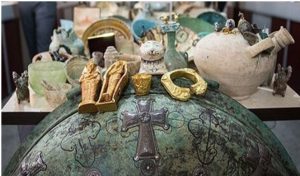 Recently, the Ministry of Cultural Heritage, Handicrafts and Tourism of the Islamic Republic of Iran, which has always been opposed to Iran’s non-religious cultural and historical heritage, has entertained the idea of implementing a new policy. This new policy, which is still in discussion, has been described as a “plan to pay the right of discovery to the public” and has been explained as giving the right to any member of the public to excavate and discover historical artifacts in a policy of giving the culture back to the people. The ministry has also said that if this policy goes into effect, they would reward individuals who dig up and discover artifacts.
Recently, the Ministry of Cultural Heritage, Handicrafts and Tourism of the Islamic Republic of Iran, which has always been opposed to Iran’s non-religious cultural and historical heritage, has entertained the idea of implementing a new policy. This new policy, which is still in discussion, has been described as a “plan to pay the right of discovery to the public” and has been explained as giving the right to any member of the public to excavate and discover historical artifacts in a policy of giving the culture back to the people. The ministry has also said that if this policy goes into effect, they would reward individuals who dig up and discover artifacts.
Since the Islamic Revolution, there has been no Iranian government sympathetic to the secular, and especially non-Shiite, cultural heritage in Iran, and as a result many sites have been destroyed by smugglers and unauthorized diggers searching for artifacts. This new policy, if approved, will no doubt make this worse and result in more destruction of cultural heritage in Iran.
In the face of this anti-cultural act by the Iranian government, supporters of cultural heritage and even some archaeologists and experts from Iran’s Ministry of Cultural Heritage, Handicrafts and Tourism have considered the issue to be a risky one. They firstly believe that such news at the public level and in the current situation is an irresponsible act, and secondly, if for any reason the Ministry cannot manage the “plan to pay the right of discovery to the public,” it will undoubtedly have dire consequences. It will also result in the encroachment upon and destruction of the ancient sites of Iran, which is also a part of world cultural heritage.















